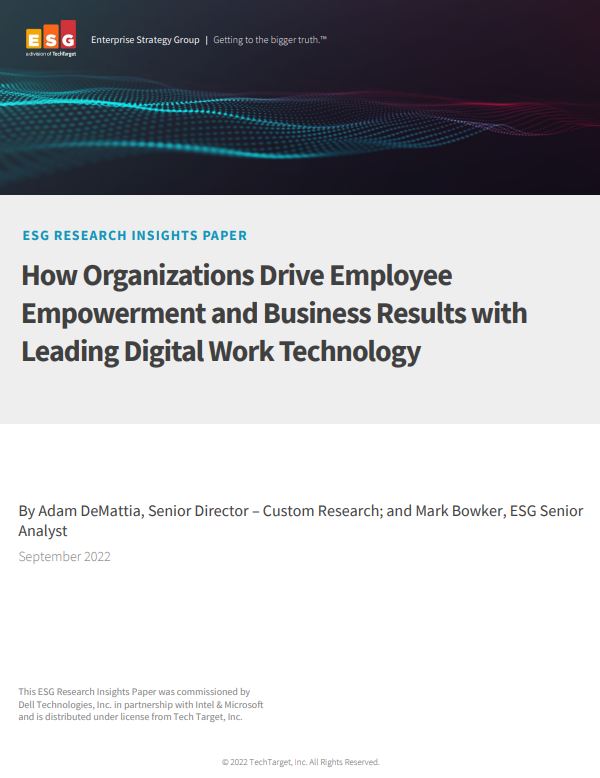IT workers' self-confidence hampering portfolio career ambitions
Research suggests imposter syndrome is holding back around half of IT professionals from realising their multi-faceted dream careers


More than half of English IT workers report being interested in pursuing a career comprised of many different jobs at the same time, but lack the confidence to commit.
The majority of IT workers (59%) said they would be interested in developing a portfolio career - a higher percentage than the average adult (52%) - but imposter syndrome stands in the way of nearly half (47%), according to new research.
RELATED RESOURCE

How organisations drive employee empowerment and business results with leading digital technology
What you can achieve with a leading approach to digital work
A portfolio career can involve a single person working two or more roles concurrently. The research comes as the UK government launched a campaign to encourage professionals to pursue part-time careers in further education (FE).
“I became a part-time further education teacher three years ago year alongside running my own IT business,” said Christian Núñez Fuentes, teacher of IT and digital subjects at Bedford College.
“I was nervous about what I could bring to the lessons, so lacked self-confidence. But I quickly realised it was my skills and knowledge from a career in the IT industry that made me most valuable to my students and colleagues.
“This grew my confidence over time as I could share what I had learnt over many years to inspire a new generation of students. It helped me grow as a teacher and I completed my training on the job, so I was able to start earning straight away. The benefits really outweighed my self-doubt.”
According to the Department for Education (DfE), 57% of all adults in England suffer from imposter syndrome - a feeling that one’s success is neither deserved nor the product of one’s talents or skills.
Get the ITPro daily newsletter
Sign up today and you will receive a free copy of our Future Focus 2025 report - the leading guidance on AI, cybersecurity and other IT challenges as per 700+ senior executives
High-skilled professionals working in engineering, construction, accountancy, digital, and healthcare are all being targeted specifically by the campaign.
The DfE aims to highlight that neither a degree nor any teaching experience is required to get started in the world of FE and many people working in these industries are already qualified enough to begin just with their working experience alone.
The value of industry professionals is believed to be great since they are able to provide students with hands-on, practical knowledge that’s wrapped in the context of real-world application.
While teaching alone may not be the route to the highest-paying jobs in the tech industry, some individuals may find more fulfilment working multiple roles while also supplementing their main salary with money earned from part-time or ad-hoc work.
How the tech sector's industry-wide mass layoffs will impact the confidence of individuals to pursue work outside of their main job remains to be seen, the value of adopting a flexible approach to keep a company's top talent happy has traditionally been appreciated. Retaining the most skilled people may involve offering workers greater freedoms in and outside of the workplace.
‘Side hustle culture’ is rife among the younger generations but research has also found that those in the 35-44 age bracket are most likely to quit their jobs in search of more flexible arrangements - be it in working hours or allowance to pursue outside endeavours.

Connor Jones has been at the forefront of global cyber security news coverage for the past few years, breaking developments on major stories such as LockBit’s ransomware attack on Royal Mail International, and many others. He has also made sporadic appearances on the ITPro Podcast discussing topics from home desk setups all the way to hacking systems using prosthetic limbs. He has a master’s degree in Magazine Journalism from the University of Sheffield, and has previously written for the likes of Red Bull Esports and UNILAD tech during his career that started in 2015.
-
 Bigger salaries, more burnout: Is the CISO role in crisis?
Bigger salaries, more burnout: Is the CISO role in crisis?In-depth CISOs are more stressed than ever before – but why is this and what can be done?
By Kate O'Flaherty Published
-
 Cheap cyber crime kits can be bought on the dark web for less than $25
Cheap cyber crime kits can be bought on the dark web for less than $25News Research from NordVPN shows phishing kits are now widely available on the dark web and via messaging apps like Telegram, and are often selling for less than $25.
By Emma Woollacott Published
-
 Tech talent shortages mean firms are scrapping traditional recruitment strategies
Tech talent shortages mean firms are scrapping traditional recruitment strategiesNews With more than half of enterprise leaders worried about future skills shortages, many organizations are turning to a range of new techniques to expand potential talent pools.
By Emma Woollacott Published
-
 Employees are dead set on flexible working arrangements – three quarters would turn down a role that didn't offer hybrid options as work-life balance becomes more important than pay
Employees are dead set on flexible working arrangements – three quarters would turn down a role that didn't offer hybrid options as work-life balance becomes more important than payNews New research shows workers are increasingly demanding flexible working arrangements from employers.
By Emma Woollacott Published
-
 Half of jobseekers turned down offers last year amid growing demands on employers
Half of jobseekers turned down offers last year amid growing demands on employersNews An increasingly competitive talent landscape means employers are being forced to offer a wider range of incentives
By Ross Kelly Published
-
 UK tech workers change jobs en masse as job security withers
UK tech workers change jobs en masse as job security withersNews Economic uncertainty, redundancies, and the desire for greater job stability are forcing workers to look elsewhere
By Ross Kelly Published
-
 Most businesses' recruitment efforts are failing neurodiverse candidates
Most businesses' recruitment efforts are failing neurodiverse candidatesNews While tech firms contend with talent shortages, they are missing out on a potentially lucrative pool of neurodiverse candidates
By Ross Kelly Published
-
 Should your business issue a hiring freeze?
Should your business issue a hiring freeze?In-depth Issuing a hiring freeze can save money in the short term, but leaving one in place for too long might be counterintuitive
By David Howell Published
-
 Wipro faces criticism after cutting graduate salaries by nearly 50%
Wipro faces criticism after cutting graduate salaries by nearly 50%News Graduates were given days to decide whether they would accept greatly reduced pay offers, prompting union action
By Rory Bathgate Published
-
 Zoom CEO takes 98% pay reduction after cutting 15% of workforce
Zoom CEO takes 98% pay reduction after cutting 15% of workforceNews 1,300 employees will be made redundant effective immediately, with affected staff notified via email in the US
By Rory Bathgate Published